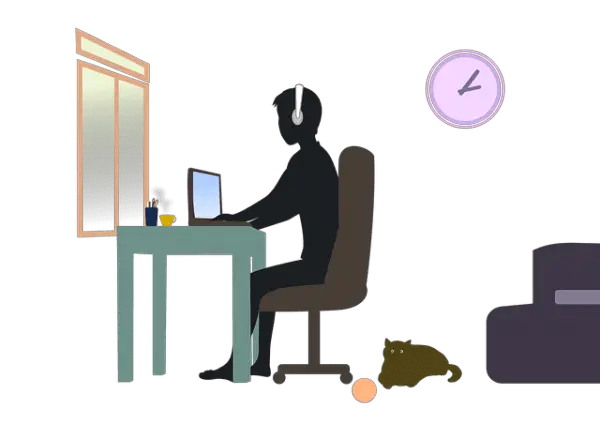Table of Contents
As more people adjust to home-based careers, you may be wondering if it is possible to successfully run a book editing career from home seeing how closely you need to work with authors and publishers. In this publication, we discuss who a book editor is, how you can specialize as one, and what it takes to build a blossoming book editing career from home.
Who Is a Remote Book Editor?
A remote book editor reviews and prepares manuscripts for publication. The book editor helps to improve the book by recommending and applying edits and fact-checks until the book is top-notch. Book editors oversee the lifecycle of the written word – sometimes from the ideation phase. They help to improve the voice, tone, style, format, and other elements of the text.
A book editor will often work with authors on multiple contracted projects for a publishing house. They sometimes work with assistants to determine the text with the highest publishing potential. Publishing houses often have different book editors with unique areas of specialization overseeing each stage of book development.
Whether you intend to work with an employer or as a freelancer, you can become a book editor while working from home. As a remote book editor, your computer and phone will suffice to get your work done from home.
Remote Book Editor: Duties and Responsibilities
The duties and responsibilities of a book editor include but aren’t limited to:
Paying attention to detail – An editor’s job is first and foremost to prepare the manuscript for publishing. This requires strong attention to detail as a book editor must be able to spot any error or irregularity in the text.
Time management – a book editor has to keep to the project timeline and deadline. Since their role is between the author and publisher, they may need to follow up with both parties to ensure the project is done as and when due.
Citation and fact-checking – A book editor has to ensure that every source is properly cited, images are properly credited and facts contained in the book are from authentic and verifiable sources. They also need to ensure all necessary disclaimers are included in the text.
Maintain online presence – If you’re a freelance book editor, you need to ensure you are searchable on the internet by maintaining your online presence through relevant and regular posts.
Subject matter expertise – It is better to have a degree in the subject matter of the book to be edited. Where that is not the case, you need to conduct in-depth research to understand the topic. You need to have an excellent understanding that can easily pass you off as a subject matter expert.
How to Get a Remote Job Without Experience
Book Editor Jobs: Areas of Specialization
Book editing is one of those career paths that affords you the opportunity to focus on what you know how to do best. There are so many areas of specialty and you can combine some to build your expertise.
Developmental Editor
A developmental editor works with the author to determine the entire structure of the book. The developmental editor considers character development, fact-checking, timelines, and narratives of the body of work. They often come in at the beginning of the project when little to nothing has been written and may give recommendations for the storytelling. Developmental editors conduct research into the subject matter, provide feedback based on market trends and recommend effective outlines for the work.
Managing Editor
A managing editor oversees the whole publication cycle without getting involved in the process of writing or creating content. Also called executive editors, they ensure the execution of the content strategy within stipulated deadlines. They also see to it that everyone on the team is well-managed.
Substantive Editor
A substantive editor focuses on enriching the narrative by removing verbosity and adding enhancing materials. This editor scrutinizes the material while concentrating on the big picture. They suggest edits that enhance the flow of the piece. Substantive editors help the author tell the same story in a more compelling, enriching, and engaging way.
Line Editor
Line editors are addicted to details. Their job is to notice every undotted i’s and uncrossed t’s. Also known as copy editors, line editors strengthen the author’s language by ensuring proper use of grammar, punctuation, and syntax. They also add cohesion and clarity to the material by giving it a logical sequence.
Their goal is to keep the readers engaged from the beginning to the end of the piece by maintaining the author’s narrative style. They ensure that visuals are properly referenced and facts are correctly stated in the text. Some copy editors work with author-approved style sheets when finalizing the book’s format.
Proofreader
A proofreader looks for mistakes and errors as the manuscript heads for publication. As the final checkpoint for the material, the proofreader is to format the material, assess its pagination and ensure accuracy on every page. The proofreader confirms the citation and identifies any omitted grammatical or spelling errors. Freelance writers often rely on proofreaders as their sole editors, so a proofreader should be well-grounded in general book editing.
How To Be A Medical Writer With No Experience
Academic Editor
An academic editor focuses on editing research papers, essays, and academic journals. They often have a bachelor’s degree in their subject matter. They are familiar with various academic style guides such as APA and MLA. They also assist other editors with their editing work.
Editor-in-chief
This role is like the pinnacle of success for current and aspiring book editors. The editor-in-chief is responsible for every phase of the publication process. They oversee operations, budget, people, production, content, and publication quality. While this specialty comes with a very heavy responsibility, it is one of the few areas that give the satisfaction of being a part of the publication process from start to finish.
Freelance Editor
Freelance editors work on book manuscripts, web copy, research papers, news articles, magazine articles, academic journals, and others. The freelance editing world is a highly competitive niche, so you need to develop techniques that will set you ahead to succeed.
However, even as a freelance book editor, you still need to operate with the established best practices in the editing field. There is an editorial code of conduct to be followed as a professional. So, as a contractor who is not employed by any organization, it is advisable to regularly familiarize yourself with the editorial body in your region to keep abreast of the best practices. You may even join editorial guilds and associations like the American Society for Editing, the Association of Indian Publishers and Booksellers, and the Editorial Freelancers Association.
Qualifications and Skills Needed to Become a Book Editor
To be a successful book editor from home, you need to get some skills and qualifications:
Educational
Book editors typically have a bachelor’s degree in related fields such as English, Creative Writing, Literature/Linguistic Studies, Communications, Journalism, or Publishing. Some go ahead to obtain a master’s degree in Writing or other related fields. Employers and clients want to know that the editor has expertise in the subject matter and a degree in the field or a related field easily settles that concern.
For example, a medical editor is likely to have a bachelor’s degree in science or another related field and a master’s degree in writing and editing. While a bachelor’s degree may not be required, it provides an advantage for some roles and gives leverage over other editing competitors.
However, having a bachelor’s or master’s degree is not an automatic ticket to being a book editor. Book editing is a highly competitive field where you need to stand out to succeed. It will take more than a degree or some certifications to stand out, especially if you want to work from home as a freelance book editor.
Networking
Working from home limits the opportunities you have to meet other people. As such, you should prioritize industry-related networking events both for professional development and work opportunities. Join editing communities and be an active participant. Attend conferences, seminars, and webinars related to the industry. Also, attend physical events in person and share your business cards which should include a link to your online portfolio.
Reading
A book editor has to read beyond their preferences. It is not enough to love reading, you have to love to read materials that may not be to your taste. Sound book editors read to understand their readers’ preferences and market trends. They also read to know titles that will resonate with readers.
Writing
Every effective book editor is also a writer. Since the job of an editor includes spotting errors and suggesting corrections, an editor needs to know well enough to identify different kinds of errors in writing and how to eliminate them. You can hone your writing skills by taking copywriting gigs and joining online writing forums.
READ MORE: Career Path As a Remote Technical Writer: Everything You Need to Know
Steps to Become a Remote Book Editor
You need to be an avid reader and a good writer to excel in book editing. These steps are necessary even after you have obtained the requisite skills and educational qualifications necessary to get the job done.
Obtain a Degree
You can often get by in a book editing career path with the ability to read and write exceptionally well. But some aspects require specialized or technical knowledge that is easier earned through a degree. Some courses like English teach book editing skills that can be applied across the board. Journalism and communication majors also include rafting, editing, revising, and publishing lessons. Suppose you want to edit books in a designated field like Artificial Intelligence, Data Science, or History. In that case, you can obtain your degree in that specific field and minor in writing-related fields.
Build Your Resume
Your resume is your number one salespoint. It should be designed to get your foot in the door. If you have taken any internships or done any projects, add them to your portfolio and link to the portfolio in your resume. Update your resume regularly to ensure you leave nothing out. Even if you are on the lookout for entry-level book editing roles, ensure your resume highlights your most relevant skills. You may need to tweak your resume to make it unique for a specific role.
Optimize Editorial Opportunities
Several opportunities exist to build up your book editing skills while still in school. Students enrolled in English, journalism, and other communication courses often have the opportunity to hone their writing, editorial, and publishing skills through the college’s literary publications, newsletters, and internships. If you have graduated, you can still contribute to online literary magazines that recruit editors who review entries. Utilize these opportunities as they will give you an edge when seeking entry-level book editing roles.
Build Your Portfolio
Remember when we said it would take more than a piece of paper or certifications to prove you have what it takes to become a book editor? Well, an additional weapon up your arsenal is your portfolio. You can easily work from home as a freelance book editor by building an online presence showcasing your completed editorial projects.
If you are short of editorial opportunities to build a portfolio, volunteer to edit different texts for free, or sign up on some freelance platforms like Fiverr and Upwork. While you may not get competitive pay for your work, you can add your experience on those platforms to your portfolio. Sometimes, to make your portfolio great, you may have to take small jobs to find experience. You may also want to freelance while looking out for a full-time position.
Invest in Training
It is easier to become a book editor than to remain one. To continue on the book editor career path, you need to continue to invest in personal development and industry networking. Participate in industry-related events. Join relevant associations, take additional training courses, and learn to use the software and technological tools relevant to your industry. The more you keep abreast of the latest practices in the book editing world, the more your career is likely to get established as a book editor.
Book Editor Salary
Book editing is a highly competitive field. The average book editor’s salary in the US is $66,343 per annum. It can sometimes go as high as $93,165 and as high as $122,280 in cities like New York. The national average salary in India is about ₹21,039.
Conclusion
Most full-time book editor roles request a degree in related fields. But there are still several opportunities for generalist book editors. While it may be challenging to find full-time positions or land clients as a freelancer, if you maintain consistency with the opportunities you have, you will become an expert in no time. Remember to continually train yourself and acquaint yourself with the latest editing tools, techniques, and technologies. Book editing is one of those careers that you can perform remotely once you can satisfy your clients or employers. Remember that the key to doing so is to edit with your readers in mind.





